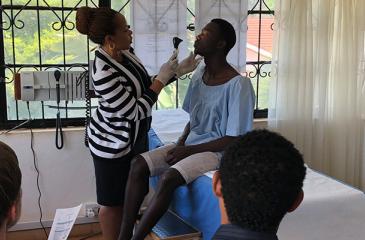Center for Global Health and Social Responsibility and the United National Migration Agency (IOM) partnership builds on Minnesota’s success
Since 2012, the University of Minnesota has partnered with the United Nations Migration Agency (IOM) to build the agency’s capacity to perform health screening and health assessments for U.S.-bound refugees.
The IOM is the leading international organization committed to the principle that humane and orderly migration benefits migrants and society. The University’s partnership with the IOM, currently led by the Center for Global Health and Social Responsibility (CGHSR), has focused primarily on training programs, exchanges and providing subject matter expertise.
“The state of Minnesota is well known for its legacy of setting standards and for its high-quality of care for refugees,” said Global Collaborations Coordinator Erin Mann. “And Minnesota is seen as offering exemplary programs within the University across multiple schools including the School of Nursing and the Medical School.”
Interprofessional education and collaboration play a big role in the partnership. As an example, a number of the trainings have involved co-training IOM physicians and nurses on topics such as interprofessional communication and working with medical interpreters.
The IOM’s activities include refugee resettlement, case processing, health assessments, travel logistics and more. Around the globe, IOM physicians, nurses and other clinicians screen and assess refugees bound for the U.S. and other countries.
In the early years of the partnership, University of Minnesota medical residents and physicians participated in short international rotations with IOM to understand pre-departure processes. In return, IOM clinicians made visits to Minnesota to meet with University and Minnesota Department of Health staff to observe processes and learn more about Minnesota’s leadership in refugee health.
“This informal exchange was valuable for both sides,” said Mann. “In 2017, the formal partnership was established and is primarily focused on workforce development.”
Bill Stauffer, MD, MSPH, CGHSR’s director of human migration & health, and professor medicine and pediatrics, infectious diseases and international medicine, serves as the faculty lead and has been instrumental in moving the project forward.
One component of the project is the development of guidelines standardizing physical examinations for pre-departure health assessments. According to Mann, the center has completed standardized physical examination skills training in many locations including Uganda, Kenya, Jordan, Thailand and Indonesia. To date, more than 80 physicians have participated in the training all over the globe.
“The idea is to build IOM internal capacity by developing a cohort of IOM trainers who are now leading training sessions,” said Mann. The next training trip is scheduled for Kiev, Ukraine in late 2019.
Other partners include the Minnesota Department of Health, the University’s Community-University Health Care Center, Ramsey and Hennepin County Public Health, Minnesota Council of Churches, Center for International Health, and community providers and clinics including Allina Health Fridley Clinic.
In addition to continuing the training for standardized adult examination guidelines, the center plans to expand its training curriculum to include pediatric-specific training, as half of all refugees are children. Better care for adult and pediatric refugees improves health, reduces costs for welcoming countries, decreases risk of transmissible infections, and improves refugee integration into local communities.
“The breadth of collaboration we have with Minnesota-based organizations is unique,” said Mann. “This project is a perfect example of the connection between global and local—this is a global health project with direct implications for our local communities.”



